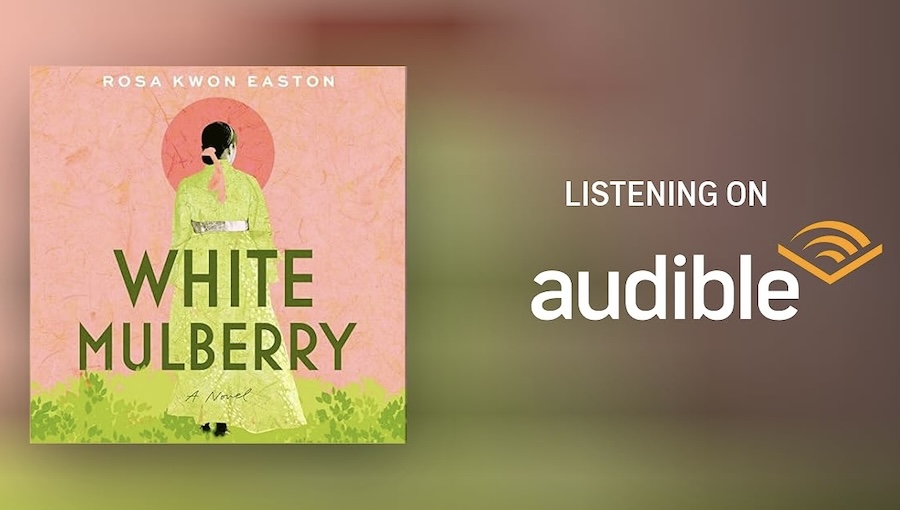The following is an interview with author Rosa Kwon Easton regarding the release of the novel, White Mulberry, through Lake Union. In this interview, Fanbase Press Editor-in-Chief Barbra Dillon chats with Kwon Easton about her creative process in bringing the debut novel to life on the page, what she hopes that readers may take away from the story, and more!
Barbra Dillon, Fanbase Press Editor-in-Chief: Congratulations on the release of your debut novel! For those who may be unfamiliar, how would you describe the story’s premise?
Rosa Kwon Easton: White Mulberry is about a spirited Korean girl coming of age in 1930s Japan in search of a better future, only to face racial persecution, heartbreaking loss, and a choice that will change her life—and the life of those she loves—forever. Miyoung’s story is about identity, belonging, and the meaning of home.
BD: As the story is set against the backdrop of the 1930s in Japan-occupied Korea, what can you share with us about your research of the period and your creative process in bringing Miyoung’s story to life on the page?
RKE: Miyoung’s story is based on the true life of my Korean grandmother. I conducted numerous interviews with my grandmother about her life in colonial Korea under the Japanese occupation and later in 1930s Japan. I also interviewed my father who helped me interpret some of his mother’s story and shared his own experience as a young child growing up during that time. My first thought was to write my grandmother’s story as nonfiction, capturing the facts and chronology of her life. But as I wrote, I realized I couldn’t explore the depths and nuances of her character as much as I wanted. It was then I decided to share my grandmother’s story through fiction, and White Mulberry was born.
Writing a novel allowed me the freedom to tell my grandmother’s tale through Miyoung’s eyes and fill out gaps in her story. I could more richly imagine how her life might have been, what her goals and conflicts were, and how she became a strong, independent woman in the end. I altered a few details—names and sequences of events—but the essence of my grandmother’s journey remains the same.
For research, I took numerous trips to Japan where I had the chance to speak with my extended Korean family who has lived in Japan for generations. In the last ten years while I was writing this novel, I dove into history books, scholarly articles, memoirs, and fictional accounts of how Koreans lived in Japan during the colonial period. I incorporated this research into the world I envisioned Miyoung must have navigated and endured.
BD: At Fanbase Press, our #StoriesMatter initiative endeavors to highlight the impact that stories can have on audiences of various mediums. How do you feel that Miyoung’s story may connect with and impact readers?
RKE: Miyoung triumphed over poverty and a patriarchal, racist society designed to break her. I wanted to lift up her story of resilience and shine a light on this little-known period of Korean and Japanese history. While there have been narratives of light-skinned women of color in the US and elsewhere “passing” as white, Miyoung’s story explores “passing” in Asian society at a particularly harsh and oppressive time. Miyoung’s courage to save her family from racial injustice despite grave danger is timely and inspiring, given that our gender, race, and identity are still being challenged today.
I hope readers will be inspired by Miyoung’s courage to be herself in a society that didn’t readily accept her, just as I was.
BD: What makes Lake Union the perfect home for White Mulberry?
RKE: Lake Union is known for elevating stories of female heroines undergoing a personal journey in diverse historical settings. In that way, I feel Lake Union is the perfect home for my novel.
BD: Are there any projects that you would like to highlight our readers?
RKE: My second book is a sequel, but also a standalone novel. Red Seal continues the story of White Mulberry as Miyoung, a 26-year-old widow and single mother, and Ko-chan, her six-year-old son, return to Korea from Japan and strive to claim their true selves, symbolized by a name seal. It is set against the backdrop of WWII, the Korean War, and eventually immigration to America. Also inspired by a true story and told through alternating chapters in Miyoung and Ko-chan’s voices, it spans thirty years of Asian and American history and explores themes of family, intergenerational conflict, identity, and belonging.
BD: Lastly, what is the best way for our readers to find more information about White Mulberry and your work?
RKE: Readers can find me on my website at rosakwoneaston.com and on Instagram, Facebook, and other social media platforms (@rosakwoneaston.com). I love hearing from readers, so I would appreciate it if people would subscribe to my newsletter and comment on my posts! The book will be released on December 1, 2024, and pre-orders are available at rosakwoneaston.com/books/.

